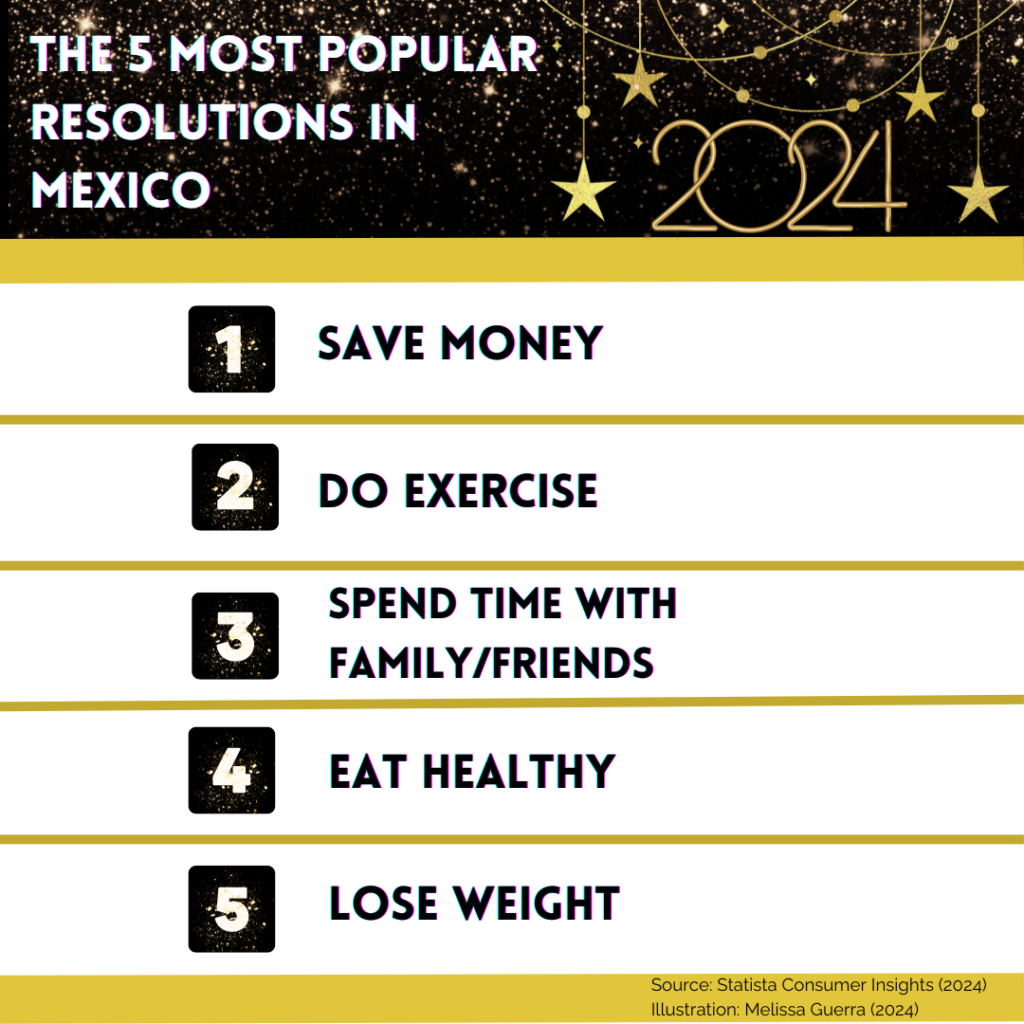Every beginning of the year is full of desire and enthusiasm to “start over,” and we have vehement thoughts that motivate us to say: “This will be my year.” However, although the effect of the new beginning has a positive impact, it must be remembered that this is temporary since the motivation and optimism represented by the euphoria of starting “from scratch”, representing many new opportunities and possibilities, does not last for always.
According to a study from the University of Scranton, only 8% of people keep their New Year’s resolutions. This is an obvious indicator that it is not just a matter of making a list, eating grapes, and “wishing for something” so that it magically happens, but of planning thoroughly to achieve and maintain them.
For the year 2024, Mexicans have the following list of goals that they aim to accomplish:

So, is it wrong to make resolutions?
Not at all. The problem with New Year’s resolutions is the way they are written, the amount they set and how they plan to achieve them, as well as the way they are visualized.
According to Per Carlbring, professor of psychology at Stockholm University, reframing a resolution can help you achieve it. “If your goal is to stop eating sweets in order to lose weight, you will most likely be more successful if you say, ‘I will eat fruit several times a day’ instead. You then replace sweets with something healthier, which probably means you will lose weight and also keep your resolution. You cannot erase a behavior, but you can replace it with something else”.
Therefore, drafting an objective is essential so it can have the correct impact and be achieved. For example, the critical points in a research thesis must be written appropriately; otherwise, what you want to investigate would not be clear, affecting subsequent processes.
In this case, creating achievable and more specific goals (and not generic ones like losing weight) provides clarity and makes them more attainable. Furthermore, writing with full awareness can be an excellent option to reflect on what you want and want to achieve and how to achieve it.
For this purpose, the SMART methodology can be used to define specific objectives. This system invites you to write them in a concrete, measurable, achievable, realistic way and with a limited duration.
It’s important to consider the number of goals you set for yourself. Although it is good to have a purpose for each aspect of your life, having too many goals can be overwhelming and may lead to not achieving anything at all. It is better to focus on one or two goals that you can realistically accomplish rather than setting 12 goals and not making any progress on them.
Take some time to think about what you really want to achieve and why you want to achieve it. This will help you prioritize your goals and make progress toward improving the areas of your life that matter most to you.
Goals and happiness
Although it is good to define goals, these will not make us completely happy since behind each goal achieved, there will be another that will “make us happier.” “When I have a truck, I will be happy,” but do you need one? Why do you feel that that particular thing will make you happy? First, we must recognize what makes us joyful.
A goal is temporary, but habits last a lifetime. James Clear mentions in his book “Atomic Habits” that life changes only for a moment when a goal is achieved. “We think we should change the results, but the results are not the problem. We need to change the systems that lead us to have those results”.
In other words, the focus should be on the process of achieving something, on the system that will achieve the desired results.
What are habits?
Duke University states that habits account for 40% of a person’s behaviors on a given day. However, a habit can be positive or negative. For example, a positive habit could be like exercising properly every day, while a negative one could be like smoking a pack of cigarettes a day.
It is commonly believed that habits can be formed in just 21 days, but this is actually a misconception. A study published in the European Journal of Social Psychology has shown that it takes at least 66 days to form a new behavior, and this can vary depending on the individual and their circumstances. Although habits are automated processes, forming them is not a simple task.
How can you build/change a habit successfully?
Consistency is key to forming habits, as well as knowing the role that motivation and discipline play within this process. Being constant is a fundamental characteristic to achieve this since these are achieved through continuous repetition. Clear explains that being 1% better every day (regardless of activity) for a year has better results than being 1% worse every day for a year.
Small changes, while seemingly insignificant, have a big impact over time, making positive results more likely. Motivation is important, but when it’s not there, discipline and self-will must take over.
Do not wait
Many of us tend to delay the start of pursuing our goals by saying things like “I’ll start on Monday” or “I’ll start next month”. This is because stepping out of our comfort zone and embracing change can be daunting. In fact, it is completely normal to experience fear when faced with change.
The mentality of waiting until Monday to start something new can be more harmful than helpful, as unexpected problems can arise, and plans may change. It’s important to have the will to take immediate action. Change should not be feared but rather seen as a source of motivation.
Usain Bolt considered the best high-performance sprinter of all time, once said: “I trained for 4 years to run 9 seconds. There are people who, because they don’t see results in 2 months, give up and quit”.
It is important to consciously state the purposes, goals, or objectives and understand what you really want to achieve and how you will obtain it. You don’t need to wait until tomorrow to start with a small change, nor do you need to despair because you do not see immediate results.
Every change involves a process which is not always linear. Consistency, motivation, and discipline are fundamental to forming or changing habits, which can either benefit or harm us depending on the decisions we make in life.
We must remember that reaching goals is great, but having positive habits will bring us closer to a complete state of well-being. Similarly, we must identify what makes us happy while not forgetting that knowing oneself is one of the most challenging tasks for a human being.
This article from Observatory of the Institute for the Future of Education may be shared under the terms of the license CC BY-NC-SA 4.0 
)
)


)